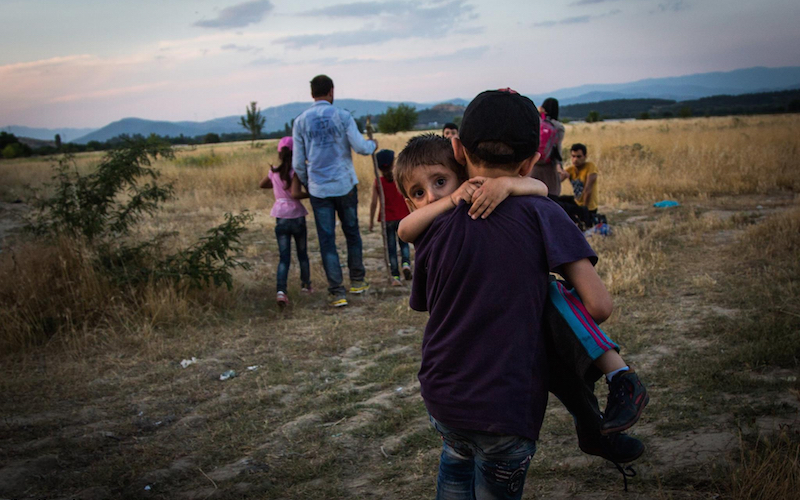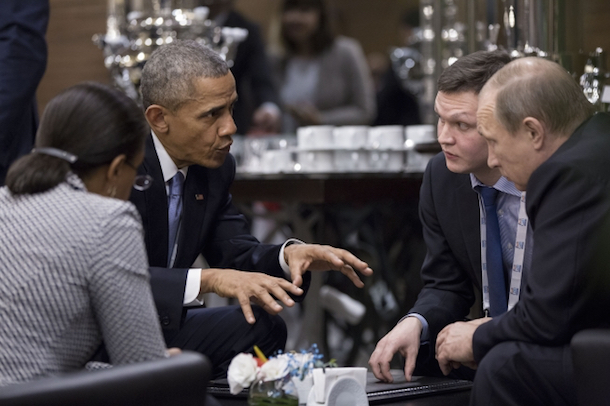
U.S. Should Join Hands With Russia to Fight ISIS
According to the Republican Right, Russia is the same bogeyman today that the Soviet Union was in the 1950s. In their view, the world in 2015 is pretty much the same as it was back then – Mr. Putin is Mr. Stalin, the U.S. is the sole super power, we live in a uni-polar world, the world is divided into black and white (good and bad), and there is a simple solution to every problem. That doesn’t sound like the world as it really is today, but a significant percentage of American citizens and policy makers cling to this simplistic, hopelessly outdated, and just plain incorrect view of the world. Putin is not Stalin, we live in a multi-polar world, shades of grey permeate the landscape, and there are precious few solutions to many of the day’s most pressing problems.
It is difficult for moderate policy makers in Washington to counter this view of the world, since, as a Harris Poll noted in 2007, more Americans believe in the devil (62%) than in Darwin’s Theory of Natural Selection (42%) (and 37% of born-again Christians still believe in witches).
When this frame of reference permeates the political landscape, and when politicians pander to such constituencies (as they do), common sense and cooler heads tend not to prevail. Yet, that is exactly what needs to happen, given how grave the terminal cancer that is the Islamic State (IS) has become.
Any rational person would have to agree that the world stands a better chance of effectively fighting IS together, than separately. Yet, given the political climate in the U.S., with poisonous demagoguery being spewed from many of the Republican candidates for the presidency, and the current composition of the U.S. Congress, the chances of the U.S. joining forces with Russia to fight IS in Syria appears remote now. It would be even more so if one of those candidates were to assume the occupancy of the White House in a little over a year.

Russia and France have decided to link arms and coordinate a response to the Sinai and Paris attacks. President Obama said this week that the U.S. will enhance it intelligence sharing with its allies. These are good steps in the right direction, however, bold steps are needed in order to turn the tide against IS and stop its relentless march around the world. European nations need to craft a coordinated response to refugee flows, open borders and intelligence sharing. Europe must come to grips with the notion that the days of open Schengen borders are waning.
Similarly, the U.S. and Russia should, at a minimum, coordinate their actions in Syria. Rather than merely staying out of each other’s way in the air, they should synchronize their air campaign planning so as to ensure they both hit the maximum number of targets in the most efficient and timely manner. It would be too much to imagine the two nations sharing intelligence on Syria at this juncture, but if they were smart, that is exactly what they will end up doing. The two nations joined forces to defeat the Nazis when neither liked each other very much. Why can they not do so now?
While Russia has been accused of targeting primarily anti-Assad forces with its air campaign, if true, its focus is likely to change as a result of the Metrojet bombing. Undoubtedly, Mr. Putin will shift focus more toward eradicating IS, which has the benefit, from Moscow’s perspective, of also serving to support Mr. Assad. The U.S. is slowly coming to the realization that the alternative to Mr. Assad is either IS or some amalgamation of jihadist groups – none of which are an acceptable alternative. Israel decided years ago that it preferred the devil that it knows (Mr. Assad). The U.S. should take a page out of Jerusalem’s play book. Do we want yet another example of a strong man ousted in favor of chaos, as in Iraq, Libya and Yemen?
No one is under the illusion that the U.S. and Russia are about to have a Kumbaya moment, but it is just plain silly that with such stakes at hand, arch conservatives and their constituents — with their hopelessly outdated views of the world – are controlling the dialectic on this subject in Washington. The same voices that abhor ‘big government’ are on the road to ensuring that it becomes even bigger in the security arena in the U.S. by inhibiting a sensible approach to battling IS, which has promised to bring its Paris moment to America. Should such an attack occur, you can be sure that the local, state and federal governments’ response will be a greater police presence on the streets, in shopping malls, office buildings and movie theaters. Perhaps that is what they, and the NRA, want.
This article was originally posted in The Huffington Post.

